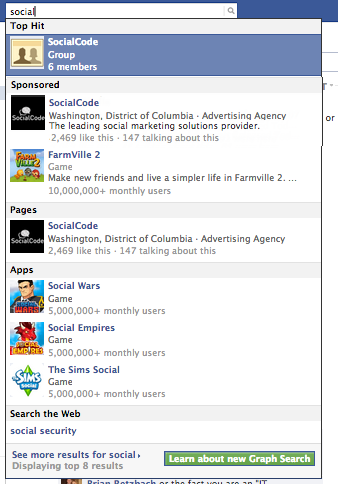Facebook Sponsored Results: An Under-Explored Opportunity
About six months ago, Facebook introduced yet another type of ad for advertisers to try: the Sponsored Result. Marketers can serve Facebook users searching for Pages, Applications, and such with ads in the Search bar. As Facebook says, the goal of Sponsored Results is “… help [Facebook users] better find and discover the brands, products, […]
About six months ago, Facebook introduced yet another type of ad for advertisers to try: the Sponsored Result. Marketers can serve Facebook users searching for Pages, Applications, and such with ads in the Search bar.
As Facebook says, the goal of Sponsored Results is “… help [Facebook users] better find and discover the brands, products, and experiences relevant to them.” For advertisers, it’s a great way to increase exposure and to send more people on to your Page or Application.

The Details
Sponsored Results ads do require some creative. While the image, title, and Page/App details will be pulled directly from the Page or App you’re promoting, advertisers do have the ability to add in text to be displayed with the ad. Character limit here is 70, just enough to highlight a feature of your Page or insert an incentive to visit your App.
A strong call to action is key to get users to click through; remember, they weren’t actually searching for your Page in the first place. Make sure you encourage them to suspend their search to check out what you’re offering. Include details of what they can find on the page, or a basic introduction to what your Page is about. App or game ads will benefit from invitations to play or mention of prizes.
You can test various text options. As with a standard Facebook ad, try a couple different approaches to see what works best. Does the call to action have to be at the beginning or end? Are users more interested in prizes or game content?
Basic targeting of Sponsored Results is the same as other Facebook types. The only thing you can’t control here is placement; by definition, placement for Sponsored Results is limited to the search bar.
Targeting Entities
Unlike AdWords, where you buy keywords, with Sponsored Results, you’ll be buying Facebook objects (Pages, Places, or Applications). Facebook refers to these as “Targeted Entities.” Whenever a user searches for that Targeted Entity, your ad could appear, depending on its bid.
So, what should you target? The best plan is to target entities similar to your own Page or App. Targeting dissimilar Pages is unlikely to generate a very high CTR; you want to be reaching users who are already disposed to be interested in your Page based on what they are searching for.
So, if you’re a soft drink brand, target your competitors. If you’re a game, target other games with similar objectives. Using one entity per ad is the best way to determine what search terms are most effective for your Page.
Limitations
Volume is a significant concern with Sponsored Results. There just aren’t enough people using the search features to make it feasible to spend a substantial amount on this ad type. Additionally, layering any hyper-specific targeting on top of the Targeted Entity reduces its reach so much as to make it essentially useless. The chance that a 30-year-old woman in Florida who likes Coca-Cola will search for the keyword [social], for example, is fairly remote.
Removing any extra targeting or targeting multiple entities at once can help solve the problem. But ,you should still expect that you’ll only be able to spend about $50 per day.
Finally, although it’s possible to generate fans from Sponsored Results, it should not be the central goal of the campaign. Click-to-conversion rates are typically low and cost-per-fan quite high.
Why Use Sponsored Results?
If they can’t get volume or generate fans, what’s the point of using this ad type?
The most effective use of the Sponsored Results ad is as a conquesting tool.
Use Sponsored Results to own all the entities most closely related to your Page, particularly competitors. Imagine a user searching for a competitor Page and instead seeing your Page at the top of the list with an engaging text calling them to visit for a chance to win. Which Page do you think they’ll click on?
So, bid high to own the Facebook entity. Remember, if you’re bidding on a CPC, you won’t pay anything unless someone actually clicks on the ad. Plus, it’s unlikely that you’ll actually pay that CPC, due to Facebook’s modified Vickery auction system. And, even if he or she doesn’t click, your ad is being seen every time that user searches for that entity.
Metrics-wise, CTR is substantially higher for Sponsored Results than in other Facebook ad types, typically over 1%. Click-to-engage is also much higher. So, even though the volume is low, the clicks you do get will be valuable.
Next Steps
Even after six months, it’s clear that not many advertisers are taking advantage of Sponsored Results. Perhaps many believe that not enough people are using the Search function to make these ads viable. In any case, Sponsored Results certainly aren’t a replacement for standard Facebook ads.
With last week’s introduction of Graph Search, it’s also unclear how long Sponsored Results will continue to exist in this form. It’s likely that they’ll change in some manner. But, because competition for the space is currently so limited, the opportunity is worth the small investment.
Contributing authors are invited to create content for MarTech and are chosen for their expertise and contribution to the search community. Our contributors work under the oversight of the editorial staff and contributions are checked for quality and relevance to our readers. MarTech is owned by Semrush. Contributor was not asked to make any direct or indirect mentions of Semrush. The opinions they express are their own.
Related stories